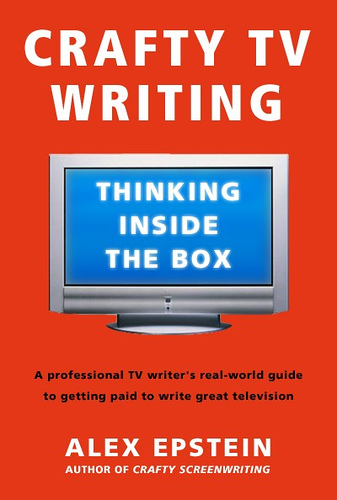
Chapter 3: Writing the Script
Action
In movie writing, it’s a rule that you should only write what you can see or hear. Don’t direct camera. Don’t talk about how the room smells, or what the character’s backstory is. If it’s not in dialogue we won’t hear it; if it’s not in the action, we won’t see it. So why write it?
TV writers break this rule in two significant ways.
One, TV writers often do put camera direction in. Partly this is because they can. The showrunner hired the director. If the director wants to get hired to direct another episode of this show, he better pay attention to how the showrunner wants the scene shot.
Even if you are not the showrunner, you may occasionally put in a camera direction to make clear how the scene is supposed to be shot. If you’re looking for a grand crane pull-away, you need to say so, because the production manager needs to have a crane available that day on the set. If you’re tight on someone’s face in shadow, the set dresser may not need to dress the entire set. The actor may not even need pants. Writers put in more direction on TV scripts because the pre-production process is so much more rushed than in the movies. Often the departments will have no more than a week of solid pre-production. That’s very little time to ponder and confer and storyboard a fifty-five page script. If production needs to know something, it’s a good idea to WRITE IT IN ALL CAPS in the script, so the crew is less likely to miss it. This includes camera moves, where they are important to telling the story: HE IS IN SILHOUETTE, WE DO NOT SEE HIS FACE.
Two, TV writers often write what the characters are thinking. This works as a kind of shorthand:
JACK
Hey, I called the other night...
Oh, my God. He knows! Jill tries to cover:
JILL
Yeah, I accidentally kicked the plug out. I’m such a klutz.
If the actor knows what the character is thinking, he can act it. The alternative would be for you to go into way too much depth of detail about what we see:
JACK
Hey, I called the other night...
Jill shrugs, maybe a little nervously. She forces a self-deprecating grin.
JILL
Yeah, I accidentally kicked the plug out.
And even then, the reader may not get it, the director may miss the point, and the actor may just be confused.
Aside from making for snappier writing, telling us what the character is thinking also puts the reader more into the character’s point of view. The episode will read better.
You have to be careful with this tool, though, and only use it for good, not evil. Someone can act “Oh my God, he knows!” Someone can act “Oh, great. I’ve put my foot in it, haven’t I?” Someone can even act, “Isn’t that just like a man?” These are all shorthand for distinct emotional reactions — specific flavors of alarm, embarrassment and disdain. But no one can act a thought:
The hematologist said the exact same thing!
Sure, the actors won’t complain. Actors often have an exaggerated sense of how much information their acting can communicate. A few actually do seem to convey what they’re thinking, but most can only convey what they’re feeling. It’s up to you to make sure you’re writing something that’s actable. If not, you have to put the thought into legitimate dialogue:
JILL
The hematologist said the exact same thing!
Staff writers will sometimes even put editorial comments into scripts, hanging a sign on the episode theme or other nuance that might go unnoticed in a quick read. The justification for it is the same as earlier. People don’t always read TV scripts as carefully as they should. There’s no time. If you don’t want to get a phone call from a confused network exec, you occasionally put in:
Yes, this is an extraordinary coincidence; that’s the point.
Subtitles for the nuance-impaired is legitimate when the episode, if properly shot and edited, will easily communicate something that the script may not get across. Producers and executives are used to reading dialogue, but editing, for example, doesn’t read well. If you want a montage to make a certain point, you’re going to have to tell us what that point is:
MONTAGE
of every moment Cordelia’s made a fool of herself.
Be careful writing directly to the reader this way. It’s slightly naughty. It may be justified when you’re on staff, but it’s risky in a freelance script, and very risky in a spec. Use it only when you’re sure of what you’re doing.